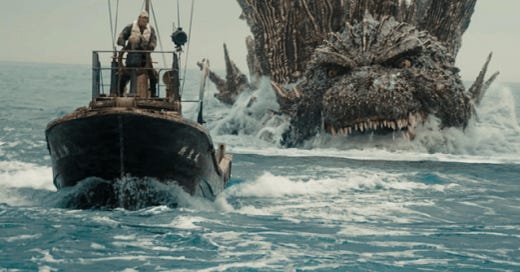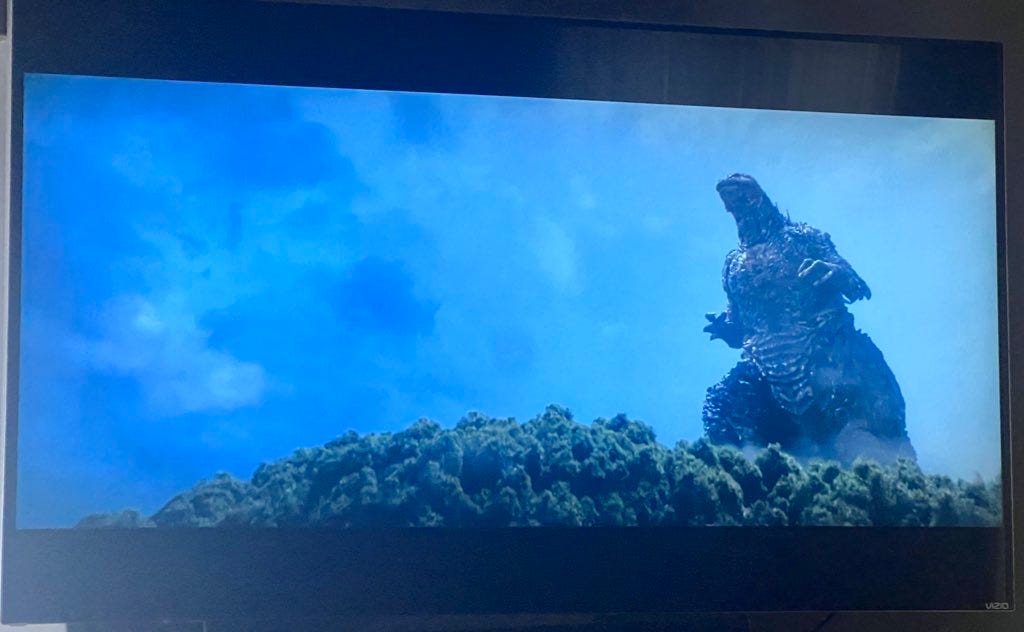Film Buffa: Japan’s going to need a bigger boat in thrilling ‘Godzilla Minus One’
After losing WWII, the dinosaur-type monster kicked their ass again.
It’s one thing to lose a World War. Coming back home to see a giant mega monster rising out of the sea to blow your house(s) to the ground is an extra kick to the head. Instead of being without your dignity and possibly some reconnecting, you’re still fighting for your life. You’re still at war.
Thats what Japanese soldiers arrive home to find: a war torn land that’s about to get lit up by Godzilla. Awoken by the atomic bomb that ended the war, the monster starts taking out towns big and small, and taking his chaos to the sea to toss tanker ships and boats like frisbees. And make no mistake: this isn’t a morally torn and unsure Zilla. This is a truly bent creature, one that just wants to seek and destroy. There’s no good there; just a thirst for destruction.
I thought about Steven Spielberg’s Jaws a lot while watching Takashi Yamazaki’s Godzilla Minus One. Just swap the shark for a bigger beast. The bulk of the movie is a village of Japanese civilians taking one deadly swing after another in trying to defeat the terrorizing creature. The CGI work on the title character is seamless, terrifying and consistent. Whether it’s a full body shot of Godzilla standing over a body of water or only keeping his head above while chasing a few courageous civilians in a fishing boat, it doesn’t take a lot of detachment to to place yourself in the shoes of the bugs hoping not to get squashed.
It’s not hyperbolic to say this is the best Godzilla movie yet, even topping the 1954 original by using the same music and producing a compelling and visually pleasing movie. It’s the first one I’d like to watch again, and soon. Instead of making a bloated and bland Hollywood production that plays like the lovechild of Michael Bay and Zack Snyder, Yamazaki’s white knuckle aesthetic sticks to the Spielberg old school horror method, dashing real history on the monster genre for the first time. You feel and connect with the characters; the movie benefits from the lack of a movie star. American audiences won’t spot many faces in the all Japanese cast, and it heightens the drama only more to sink in deeper with the characters. You can’t attach them to eight or nine other movies. They’re the characters only for two hours, and it fits Minus One to a tee. Everything locks in.
The movie wouldn’t hit as hard without a pulsating score that swims between Hans Zimmer, James Newton Howard, and Ludwig Goransson’s work. Naoki Sato’s music builds a wall of emotion around the endangerment of the plot, painting a David(s) versus Goliath type setup that never lets up. Few movies can buzz in and out in two hours while never losing focus. Minus One does that.
The final 20 minutes, where the civilian army throws everything and the kitchen sink at Godzilla, is absolutely riveting cinema. Fighting it with pilot jets, tanker nets, inflatables and anything else it can find to trap and destroy the beast, you’re biting any nails left completely off and glued to the screen. It’s almost as if Japan used a piece of their tortured history to show Hollywood how to make an old school action drama that feels like its release date ends in 1995 instead of 2023. Marvel could learn a few CGI tricks from the computer wizards here.
Ryunosuke Kamiki holds the vital lead protagonist role with a raw dignity forged by grief and a need to exact revenge for his homeland, but I grew to love Hidetaka Yoshioka’s engineer and Munetaka Aoki’s mechanic. They both become very valuable during the finale. Audiences will love them, as long as theaters keep it there.
Godzilla Minus One is the under the radar banger that’s helping carry the box office load in wake of Aquaman and the Lost Kingdom’s massive underperformance. Yamazaki’s blast from the past grossed $11 of its $15 million budget in the opening weekend of its U.S. run, and now sits at $81 million worldwide. The man who speaks to fish will be crawling to that mark. You don’t need to overspend in order to attract the masses if you put the money in the right spot and make something that seems familiar highly original again.
Godzilla Minus One gets its title from the idea that Japan was already at zero before the monster showed up. After I finished it, grasping my breath and pumping my fist for a foreign country win during a time where they had taken so many American lives in a brutal war, my faith in the Godzilla genre was suddenly robust. When done right, cinema can’t be beat for entertainment value.
If superhero movies and remakes aren’t your thing, place your bets here.





